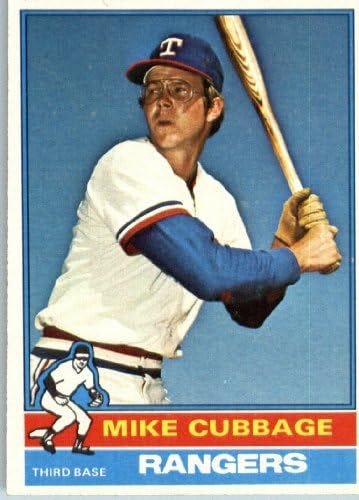There’s no way that I could have known this at the time, but baseball changed forever in 1976. Change really only makes sense if you’re aware of the conditions that came before it, and my familiarity with baseball could be measured in weeks and months when the 1976 season began. For example, I didn’t know that players were once the property of the team that owned the rights to their labors.
Take Mike Cubbage, for example. He had been drafted prior to the 1971 season by the Washington Senators of the American League, who were owned by a man named Bob Short. He decided, near the end of that season, to move his team to Arlington, Texas for the 1972 season. By the time Mike Cubbage made his major league debut in early 1974, he could play for the Texas Rangers, if they were happy with his performance, or for another team, if the Rangers decided they wanted to trade him away, or for nobody at all, if the Rangers decided to release him. Those were his only options.
His first major league season didn’t go well at all. It consisted of a handful of games played in the majors, followed by a season-long stretch at Triple-A, and then a late September call-up to end the year. In all, he logged 15 at bats, with zero hits and no walks, either. His baseball career probably felt like it was hanging by a thread.
The following season he was back at Triple-A, but by mid-June he was called up to the major leagues again, and on June 20th of 1975 he broke into the hits column in the biggest way possible by hitting a grand slam against Bill Singer of the California Angels. He ended that season with a .224 average but after the season was over, major league baseball hit an iceberg which would change its fortunes forever.
In December of that year, an arbitrator decided that two pitchers, Andy Messersmith and Dave McNally, were entitled to become free agents because they had played the 1975 season without a contract to a major league team. It became apparent to the owners that other players would soon become free agents too, as soon as they played for one season without a contract.
While there was little danger that a player like Mike Cubbage would set off a bidding war for his meager services, the owners could still trade players at will, which allowed them to shape their teams to their liking before free agency began to take hold. In June of that year Cubbage was traded, along with three other players and a quarter million dollars in cash, to the Minnesota Twins for future Hall-of-Famer Bert Blyleven and infielder Danny Thompson, who would be dead from leukemia before the year was out.
Mike Cubbage found a home in Minnesota over the next four seasons, even if that meant playing for an owner who did what he could to resist the changing economic structure of baseball. After the 1980 season, he did make one stab at a free agent payday, signing a three-year, one million dollar contract with the New York Mets. Cubbage wasn’t a Bobby Bonilla-sized bust, but he sure didn’t earn his money, either.
After his playing days ended Cubbage managed for a number of organizations, and he also served as a bench coach for the Boston Red Sox in the 2003 season that came agonizingly close to reaching the World Series. There was a short period in October of 2003 when I was convinced that Wrigley Field and Fenway Park were going to give us a World Series for the ages, but alas. You should never count your chickens, I suppose.
Free agency didn’t benefit Mike Cubbage quite as much as it did for some of his compatriots, but still it must have been nice to break free from the clutches of baseball’s tyrannical owners in the early-to-mid 1970s. Watching history unfold right before your eyes can never be boring, particularly when it brings a $1 million contract with it.
Until next time….





Thanks for awakening more memories for me. I’m hearing the voices of Mets announcers of the era, Ralph Kiner and Bob Murphy reminiscing when Cubbage came to the team…. BTW, I do owe you an email that I’m putting the final touches on —
It did change everything, and to mind, for the better. I still dislike that players have to wait for years before they can bargain for a contract.